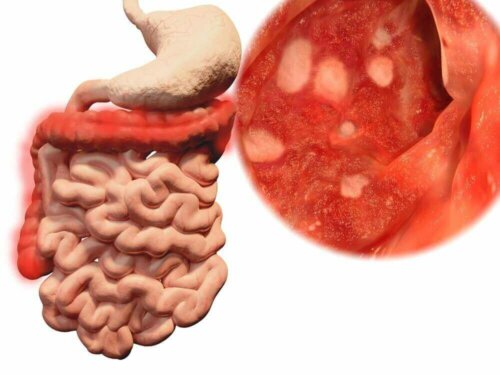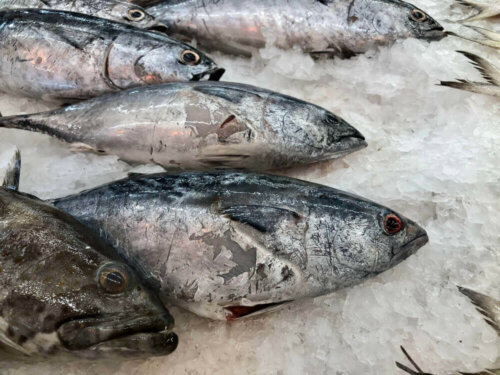Can You Eat Food that Has Fallen on the Ground?


Written and verified by the nutritionist Saúl Sánchez Arias
It’s fairly common to eat food that has fallen on the ground after lightly cleaning or blowing on it. You’ve probably heard of the five-second rule. However, is it safe or are we putting our health at risk?
At some point, most people have asked themselves this question. Therefore, in this article we’ll analyze why you shouldn’t eat any product that has come into contact with the ground.
There are microorganisms on the ground
Although you might not be able to see them, there are millions of living microorganisms that live in the soil. Some are harmful to humans, while others are harmless. However, when some food comes in contact with the ground it becomes covered with these living organisms.
For this reason, it creates a perfect breeding ground for those pathogens to colonize its surface. If you eat the food, you’ll introduce a lot of harmful elements into your body that could cause infections.
An example of this type of bacteria is E.coli, present in some types of contaminated meats and in the intestine. Certain strains of this genus can trigger severe gastrointestinal diseases, as detailed in an article published in the Brazilian Journal of Microbiology.

Washing the food with water isn’t enough
Before eating it, many people wash food with water once it falls on the floor. However, clean water isn’t able to destroy possible pathogenic microorganisms that have colonized its surface.
Therefore, cleaning food with water isn’t an effective solution to reduce the danger of existing bacteria. It’s true that water can reduce yeast and fungal populations a little. However, the rest of the microorganisms won’t be affected, as stated in a study published in 2018.
Be sure to read: The 8 Most Common Mistakes When Washing Dishes
The correct thing is to throw out the food
If you dropped the food on the ground, unless it’s going to go through a high-temperature cooking process, the best option is to throw it out. However, you might drop some fruit with the peel still on. In this type of situation it’s sufficient to peel the fruit well, making sure that there are no remains of the peel left on it.
In any case, we recommend you throw away any food that has fallen on the ground, especially if you don’t know how clean it is. It’s not the same thing when you drop food on the floor of the house, where you can relatively guarantee its hygiene, than on the street.
The importance of food hygiene
People often don’t give food hygiene the attention it deserves, but maintaining good food hygiene habits is crucial to prevent diseases. Simple practices, such as not breaking the cold chain or cooking food completely, will prevent bacterial growth.
Otherwise, you can be exposed to contamination that can cause gastrointestinal problems or other, more serious, conditions. We also recommend you don’t mix raw food with cooked food and use clean utensils to handle different foods.
Good conservation and packaging practices are essential in limiting bacterial growth. You should remember that a number of deaths occur in developed countries every year from eating contaminated food. However, the number of deaths for this reason is much higher in developing countries.
Fortunately, in a large number of countries there’s access to clean water, which reduces the risk of contamination. Despite this, you’re often exposed to dubious food hygiene practices that can lead to food poisoning.

Discover: Cholesterol in Seafood: Does it Affect Your Lipid Profile?
It’s better not to eat food off the ground
Unless the food falls on the floor of the house itself, or you’re going to cook it completely, we recommend you throw out food that comes into contact with the ground. That way, you won’t endanger your health by ingesting microorganisms that can be harmful to the body.
On the other hand, you should remember the importance of maintaining proper food hygiene practices to maintain good health. Poor food hygiene can lead to food poisoning, and this can cause severe problems in some cases.
All cited sources were thoroughly reviewed by our team to ensure their quality, reliability, currency, and validity. The bibliography of this article was considered reliable and of academic or scientific accuracy.
- Gomes TAT., Elias WP., Scaletsky ICA., Guth BEC., et al., Diarrheagenic escherichia coli. Braz J Microbiol, 2016. 1: 3-30.
- Nriagu J., Xi C., Siddique A., Vincent A., Shomar B., Influence of household water filters on bacteria growth and trace metals in tap water of doha, qatar. Sci Rep, 2018.
This text is provided for informational purposes only and does not replace consultation with a professional. If in doubt, consult your specialist.








